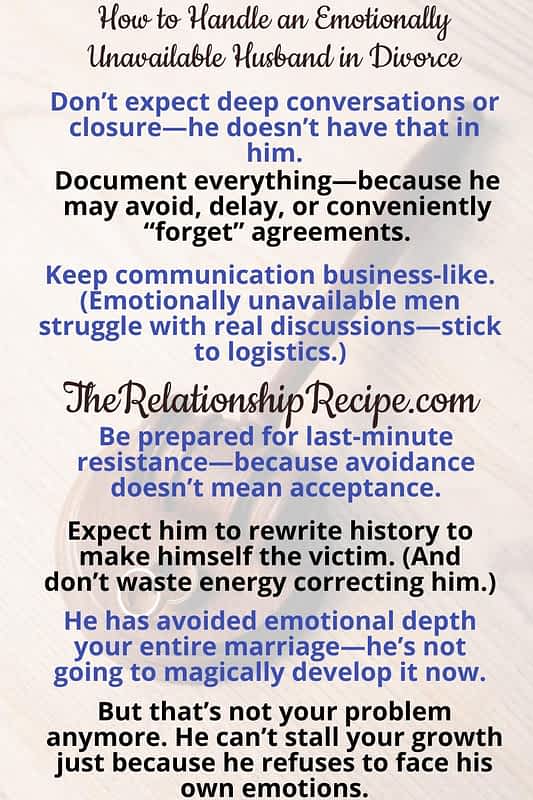7 Harsh Realities of an Emotionally Avoidant Husband in Divorce
We’re just starting the separation, and I keep thinking about how my emotionally avoidant husband in divorce mode is going to show up, or not show up, for any of this.. My ADHD mind always has to know whats next, so I can try to brace myself for what might be coming, and prepare for the worst.
I realized recently that my husband is very emotionally avoidant / unavailable. Ironically, this revelation hit me hard one day while I was writing an article about emotionally unavailable husbands.
I’ve always known he was usually emotionally stoic, (unless it’s anger) but I didn’t have words to put to the behavior until I was researching for the blog post.
Before, I didn’t think he was like this because I’d seen him cry – and he can be affectionate when he wants to. What I’ve learned since, is that emotionally avoidant people can turn it off and on when it suits them, or when it seems appropriate (like crying after a family member passes away.)
Because he is emotionally unavailable, I expect him to handle divorce the same way he handled our marriage – by avoiding, dismissing, ignoring my unhappiness, or shifting blame. In fact, he barely blinked when I told him I decided to go through with the divorce, after giving him another 9 months for change (he asked for 6 months when I first told him I was done). Of course nothing changed, and I knew it wouldn’t, but that can be another blog post for another day.
The emotionally avoidant husband will likely be happy in a perfunctory marriage. One that looks good on the outside, and orderly on the inside. He doesn’t require much intimacy, so a marriage without emotional closeness is all he really needs. He’s really not interested in fulfilling his wife’s emotional needs.

💡Key Highlights:
- Discover the emotional tactics commonly used by an emotionally avoidant husband in divorce.
- Learn how to protect your emotional well-being through each stage of the divorce.
- Understand why he might downplay, withdraw, or manipulate during the process.
- Gain insight into handling stonewalling, blame-shifting, and sudden sentimentality.
- Find practical tips for staying strong and focused while navigating a difficult separation.

7 Possible Behaviors From an Emotionally Avoidant Husband in Divorce
🚩1. Avoidance
He may act like the divorce isn’t happening or refuse to discuss it.
“Let’s not make a big deal out of this.”
An emotionally avoidant husband in divorce may pretend everything is fine, refusing to engage in serious discussions about the split. He might dismiss your concerns, avoid paperwork, or even act as if your relationship is still intact.
✔️Why He’s Saying This:
Avoidance is his defense mechanism. Acknowledging the divorce forces him to confront painful emotions: guilt, fear, failure … that he’s not equipped to handle. By downplaying the situation, he protects himself from discomfort, even at your expense.
👉What’s Going Through His Mind:
- “If I don’t talk about it, maybe it won’t feel real.”
- “I don’t want to deal with drama or emotions.”
- “I’d rather act like nothing’s wrong than admit I failed.”
This refusal to engage can leave you feeling like you’re dragging him through the process alone, which is emotionally exhausting.

🚩2. Minimizing
He’ll downplay your unhappiness and make it seem like you’re overreacting.
“I don’t know why you’re doing this.”
An emotionally avoidant husband in divorce often refuses to acknowledge the depth of your pain. Instead of validating your feelings, he may act as though your decision to leave is irrational, unnecessary, or dramatic. He might insist that things “weren’t that bad” or suggest you’re being overly emotional.
✔️Why He’s Saying This:
Minimizing is his way of maintaining control over the situation while avoiding accountability. If he can convince himself (and you) that your reasons for leaving aren’t valid, he doesn’t have to face the reality that his emotional unavailability contributed to the marriage’s breakdown.
👉What’s Going Through His Mind:
- “If I act like this isn’t a big deal, maybe she’ll rethink it.”
- “I don’t want to take responsibility for how she feels.”
- “Admitting she’s right means admitting I failed.”
This response can leave you second-guessing yourself, making it even harder to stand firm in your decision. It’s a form of gaslighting that shifts the focus away from his behavior and onto your supposed overreaction.

🚩3. Passive-Aggressiveness
He might refuse to cooperate but won’t directly say no. (Ignoring paperwork, delaying important decisions, dragging his feet on financial matters.)
An emotionally avoidant husband in divorce may not openly fight you, but he also won’t make the process easy. Instead of directly refusing to sign papers or discuss financial matters, he may stall, make excuses, or conveniently “forget” important deadlines. His actions (or lack thereof) create unnecessary stress, prolonging an already painful situation.
✔️Why He’s Doing This:
Passive-aggressiveness allows him to maintain control without direct confrontation. He doesn’t want to deal with the reality of the divorce, but he also doesn’t want to appear like the bad guy by outright refusing to cooperate. Dragging his feet is his way of expressing resistance while avoiding an emotional or legal battle.
👉What’s Going Through His Mind:
- “If I delay long enough, maybe she’ll give up or change her mind.”
- “I don’t want to deal with this, so I’ll just ignore it.”
- “She’s the one who wants this, so she can handle everything.”
His passive-aggressive tactics can leave you feeling frustrated and drained, forcing you to push the process forward while he refuses to take responsibility.

🚩4. Blame-Shifting
He will likely make it about you. (“You’re the one who’s unhappy, not me.” “I was fine with how things were.”)
When divorcing an emotionally avoidant husband, he may turn the tables, deflecting blame onto you instead of taking responsibility for his role in the relationship’s downfall. Instead of addressing his emotional unavailability or other issues in the marriage, he may insist that you’re the one at fault for being unhappy or wanting the divorce. This can leave you feeling like the bad guy, even though you’re the one who’s been hurt.
✔️Why He’s Doing This:
Blame-shifting is his way of protecting himself from the shame or guilt of facing the truth. By making it about your unhappiness, he avoids having to confront his own emotional shortcomings or the fact that he may not have been emotionally available when you needed him most.
👉What’s Going Through His Mind:
- “If I make her feel guilty for being unhappy, maybe she’ll stay.”
- “I don’t need to change because I didn’t do anything wrong.”
- “If I keep saying I was fine, I don’t have to face the truth.”
Blame-shifting can leave you feeling isolated, as though you’re carrying all the emotional weight of the divorce alone, even though both partners contributed to the marriage’s breakdown. It’s a tactic to avoid accountability, leaving you to carry the burden of his emotional neglect.

🚩5. Indifference (Real or Fake)
He might act like he doesn’t care at all to protect his ego. (“Whatever, do what you want.”)
When divorcing an emotionally avoidant husband he may seem completely indifferent to the situation, as if he has no emotional stake in the outcome. He might throw out phrases like “Whatever, do what you want” or give you the cold shoulder, acting as if he doesn’t care about the divorce or your feelings. This facade of indifference is often a defense mechanism to protect his ego from the emotional weight of the separation.
✔️Why He’s Doing This:
Indifference allows him to appear detached and unaffected, which shields him from having to confront the pain of the divorce or admit his emotional shortcomings. By acting like he doesn’t care, he avoids vulnerability, making it easier for him to navigate the situation without addressing the deeper emotions involved.
👉What’s Going Through His Mind:
- “If I act like I don’t care, I won’t get hurt.”
- “I don’t want to seem weak or desperate, so I’ll shut down.”
- “I’d rather seem unaffected than admit this hurts.”
This apparent lack of emotion can be frustrating and confusing, especially when you’re facing the end of the relationship and looking for answers. Whether it’s a real or a calculated front, indifference from an emotionally avoidant husband can leave you feeling like you’re dealing with the divorce alone, further deepening the emotional distance between you both.

🚩6. Sudden Sentimentality (When It’s Too Late)
He might pull out emotional memories, trying to guilt you into staying. (“Remember how good we used to be?” “We have so much history.”)
As the divorce progresses, an emotionally avoidant husband may suddenly become sentimental, dredging up memories of happier times in an attempt to make you feel guilty for leaving. He might start talking about how great things were in the past or emphasize the “history” you share, hoping that nostalgia will cloud your judgment and make you reconsider your decision.
✔️Why He’s Doing This:
This sudden emotional appeal is often a last-ditch effort to keep the relationship intact. He may have been emotionally unavailable throughout the marriage, but now that you’re ready to leave, he might feel the need to salvage the situation by tapping into those emotional connections. It’s often too little, too late – he’s only showing this sentimental side now because the threat of losing you is real.
👉What’s Going Through His Mind:
- “If I remind her of the good times, maybe she’ll stay.”
- “We’ve been through so much together—how can she just walk away?”
- “Maybe if I pull on her heartstrings, I can stop the divorce.”
While it might seem heartfelt in the moment, this sudden sentimentalism often lacks the emotional depth that should have been present throughout the marriage. It can feel manipulative, as he is using your shared history to guilt you into staying when you’ve already made the decision to move on.

🚩7. Silent Treatment / Stonewalling
If he can’t control the situation, he might withdraw completely to punish you. (Refusing to talk, refusing to acknowledge what’s happening.)
One of the most painful tactics an emotionally avoidant husband in divorce may use is the silent treatment or stonewalling. When he feels like he can’t control the situation or you’re pushing for things to progress too quickly, he may completely withdraw, refusing to talk, engage, or acknowledge the reality of the divorce. This emotional shutdown can feel like a punishment, leaving you alone to carry the weight of the situation.
✔️Why He’s Doing This:
Stonewalling is a defense mechanism, often triggered when he feels cornered or out of control. Rather than confronting difficult emotions or making decisions, he shuts down to avoid facing the consequences of the divorce. This withdrawal is also a way for him to regain some power in the situation, especially if he’s been emotionally unavailable throughout the marriage. By not acknowledging what’s happening, he can pretend it’s not real, at least for a while.
👉What’s Going Through His Mind:
- “If I shut down, maybe she’ll give in and back off.”
- “I can’t handle talking about this, so I’ll just shut down.”
- “If I don’t engage, I don’t have to face the reality of losing her.”
The silent treatment can be incredibly frustrating, especially when you’re trying to make decisions or find closure. It feels like a power play, and it can leave you feeling isolated and rejected, as if you’re going through the divorce alone. This stonewalling behavior only deepens the emotional divide, making it harder to move forward with any clarity.

Dealing With Divorcing an Emotionally Avoidant Husband:
- Don’t expect deep conversations or closure; he doesn’t have that in him.
- Document everything because he may avoid, delay, or conveniently “forget” agreements.
- Keep communication business-like. (Emotionally unavailable men struggle with real discussions, so stick to logistics.)
- Be prepared for last-minute resistance because avoidance doesn’t mean acceptance.
- Expect him to rewrite history to make himself the victim. (And don’t waste energy correcting him.)
- He has avoided emotional depth your entire marriage and he’s not going to magically develop it now.
- But that’s not your problem anymore. He can’t stall your growth just because he refuses to face his own emotions.

Wrapping Up: Understanding the Emotionally Avoidant Husband in Divorce
Dealing with an emotionally avoidant husband in the divorce process can be incredibly challenging. His avoidance, blame-shifting, passive-aggressiveness, and manipulative behaviors often create confusion and emotional turmoil as you try to move forward.
✨While it may feel like you’re going through the process alone, understanding his tactics can help you maintain your clarity and emotional strength.
Whether he’s minimizing your feelings, suddenly sentimental, or stonewalling to regain control, etc. these behaviors stem from his deep fear of facing the reality of the divorce, and his inability to confront his own emotions.
Recognizing these harsh realities when divorcing an emotionally avoidant husband can empower you to stand firm in your decision, and take the necessary steps toward healing and closure. The road ahead may be difficult, but knowing what to expect can help you manage your expectations and move through this process with more confidence and resilience.

FAQ: The Emotionally Avoidant Husband in Divorce
1. What is an emotionally avoidant husband in divorce?
An emotionally avoidant husband in divorce tends to withdraw, minimize emotions, and avoid confrontation. He may not acknowledge the divorce or your feelings, making the process harder.
2. Why does my emotionally avoidant husband refuse to talk about the divorce?
He avoids the conversation to protect himself from uncomfortable emotions. Acknowledging the divorce forces him to confront difficult feelings he’s not prepared to handle.
3. How can I deal with my emotionally avoidant husband in divorce when he refuses to communicate?
Focus on setting clear boundaries and stay consistent. Be direct about your needs, and seek professional support to navigate the emotional distance he creates.
4. Is an emotionally avoidant husband likely to feel guilt during a divorce?
It’s possible, but he may not express it. Instead, an emotionally avoidant husband in divorce often avoids acknowledging his guilt, which leaves the emotional burden on you.
5. Why does my emotionally avoidant husband downplay my unhappiness?
He minimizes your feelings because acknowledging your unhappiness forces him to face his own emotional issues. He may also use it as a defense to avoid taking responsibility.
6. What is passive-aggressiveness in an emotionally avoidant husband during divorce?
An emotionally avoidant husband in divorce may delay decisions or avoid paperwork as a form of passive resistance. He avoids confrontation by stalling rather than outright refusing.
7. How can I handle my emotionally avoidant husband’s blame-shifting behavior?
Stay firm and clear about your emotions and actions. Remind him of his role in the relationship, but avoid getting caught in a cycle of blame—stick to your truth.
8. Why does my emotionally avoidant husband suddenly get sentimental during divorce?
He may try to use nostalgia to guilt you into staying. His sudden sentimentality is often a reaction to the fear of losing control or connection as the divorce moves forward.
9. What’s the best way to respond when my emotionally avoidant husband acts indifferent?
Don’t engage in emotional games. Keep the conversation focused on necessary divorce matters, and don’t take his indifference personally—his detachment is his way of protecting himself.
10. How does stonewalling affect the divorce process?
Stonewalling creates more obstacles, prolonging the process. An emotionally avoidant husband in divorce uses silence to regain control, but it only adds frustration and delays resolution.
11. Is it normal for an emotionally avoidant husband to withdraw during divorce?
Yes, emotional withdrawal is common in emotionally avoidant husbands. He may try to escape the pain of the divorce by becoming distant and unresponsive.
12. How do I deal with my emotionally avoidant husband’s refusal to cooperate in divorce?
Stay persistent. Keep the focus on your needs and work with a lawyer or mediator to ensure the divorce progresses despite his lack of cooperation.
13. Will my emotionally avoidant husband ever admit his emotional issues during divorce?
It’s unlikely unless he seeks therapy or recognizes his behavior. Most emotionally avoidant husbands avoid acknowledging emotional issues during divorce to protect themselves from vulnerability.
14. Why does my emotionally avoidant husband seem to get angry when I bring up the divorce?
Anger is a defense mechanism. An emotionally avoidant husband in divorce may react with anger to deflect from his fear and vulnerability, especially when confronted with emotional truths.
15. How can I protect myself emotionally during a divorce with an emotionally avoidant husband?
Focus on self-care and set strong emotional boundaries. Consider therapy or support groups to help you process the challenges of dealing with an emotionally avoidant husband in divorce.

Thank you for reading this post, don't forget to subscribe!







